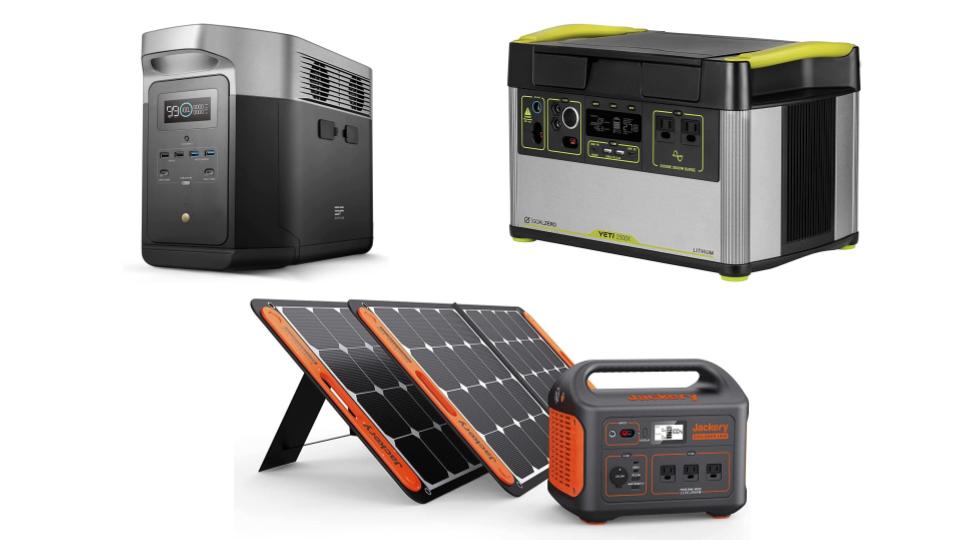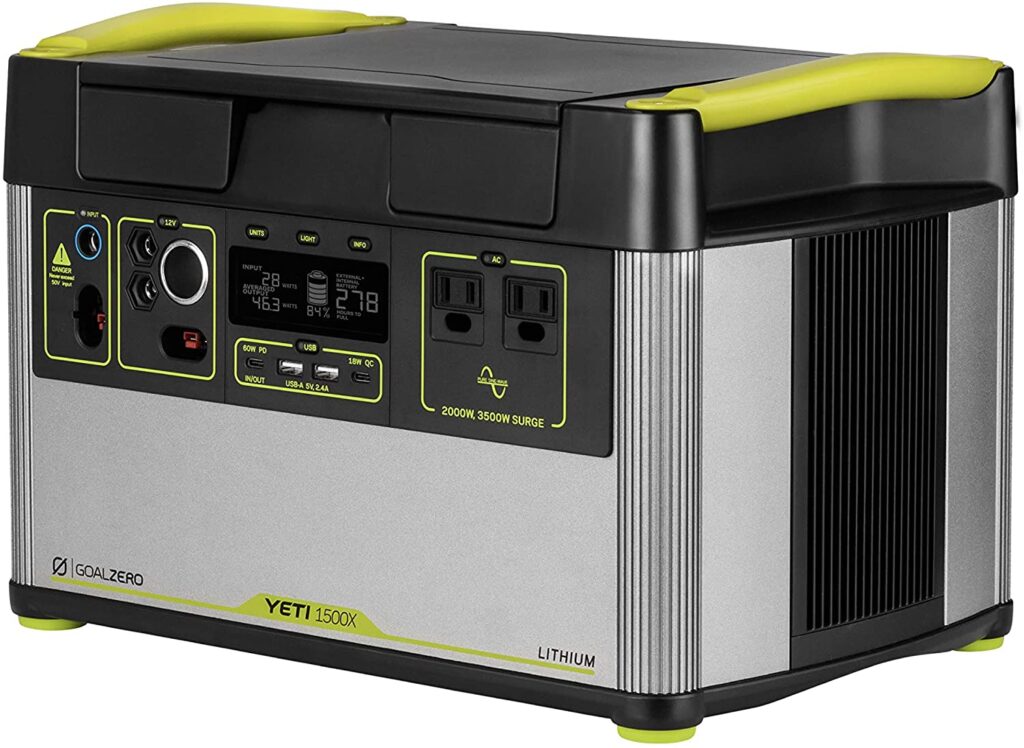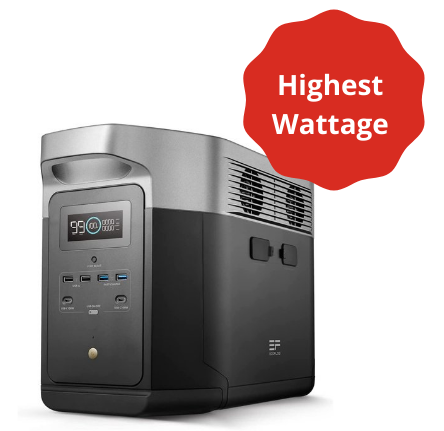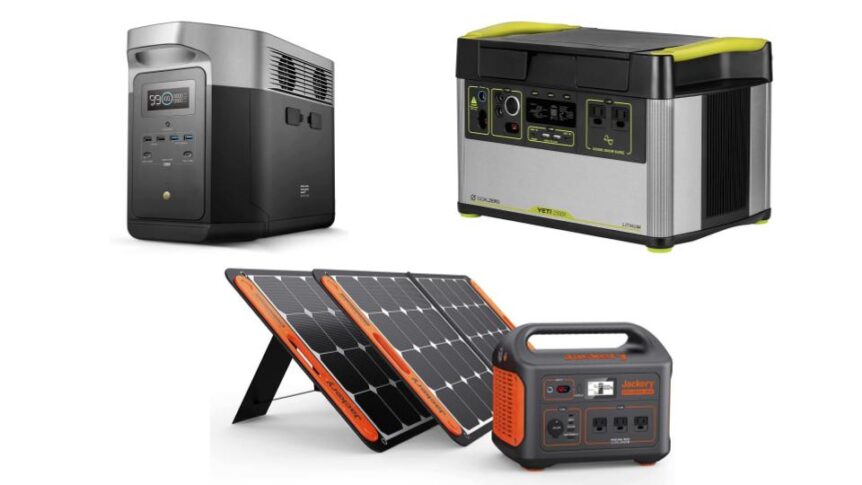Check out 3 of the best eco-friendly generators to run your appliances and electrical devices at home

Whilst battery power may still be a relatively new technology there is no doubt this is where the world is going in terms of alternative power sources. In fact, UBS estimates that in the next 10 years battery storage in the United States could increase to $426 billion.
You can see this transition to battery power in the real world with the increase of electric cars and e-bikes to the topic of this article, battery-powered generators, as society looks to decarbonise and find more eco-friendly power solutions.
So if you are thinking about switching to electricity and are looking for the best battery generator to power your home I would say this is a wise decision.
In this article, I’ve put together the 3 Best Battery Powered Generators For Your Home, which are suitable for running household appliances in a blackout such as refrigerators, microwaves and electrical devices.
Contents:
- Pros & Cons of battery generators
- Buyers guide
- Jackery Solar Generator 1000
- Yeti 1500X Portable Battery Power Station
- EF ECOFLOW Portable Power Station
- Key takeaway
Pros & Cons of battery generators
Before we dive in it’s worth taking a look at why buying a battery generator is a good choice and a few of the downsides to this relatively new technology.
Pros
- Environmentally friendly – Battery-powered generators are eco-friendly and emit zero-emission as opposed to traditional standby generators
- Quiet – They are very quiet so no annoying the neighbours with a constant high pitch humming
- Quick start – There is no continuous pulling of the cord to get portable battery generators started. Just an easy start with a push of the button
- Lower running costs – Battery-powered generators have fewer moving parts than standby generators which means less wear and tear over time and the subsequent costs
- Free energy – When using solar panels you draw energy from the sun which means free energy
- Powered by multiple sources – Battery-powered generators can be charged by the mains or solar panels
- Connect directly to grid – Some battery generators can connect directly to the grid, providing easily-accessible power
Cons
- Lower watt capacity – Battery technology is still developing which means battery-powered generators typically have a lower power supply than fossil fuel generators
- Higher upfront cost – Again because this is a new technology the initial cost is also higher. Solar panels are also typically sold separate from the generator, increasing costs. However free energy from solar panels and lower running costs should offset this over time
- Slower recharging – Battery generators don’t have power on demand and take time to charge. This is especially the case when charging through solar panels. Charging through a fixed home plug socket is quicker, however.
Buyers guide
Wattage
The main consideration for buying any generator is what will you be using it for and how many devices you intend to run off it.
Buying a battery power generator for backup for your home will be different to buying a battery generator for a camping trip where you would typically use it to power low wattage devices.
Look for a generator over 1000 watts especially if you need it to power household appliances such as fridges and freezers in a power outage.
Portability
If you intend to use your generator outside the home for things like camping trips or even fairs you may want to consider how portable it is by checking the weight.
Battery-powered generators tend to be lighter anyway in comparison to diesel or petrol standby generators making them relatively portable.
Surge watts vs running watts
When choosing a battery generator you need to take into consideration the extra surge or startup watts of your appliances. This is the amount of power needed to get the appliance started which is higher than the watts needed once it is running.
For example, a freezer may need 500 watts to get it started (surge watts) but only take 150 watts once it’s running (running or rated watts).
1. Jackery Solar Generator 1000

Solar Panels Included*
Product features:
- 1000 running watts
- 2 x solar panels
- 3 standard pure sine wave AC outlets
- 80% solar charging in 6.5 hours
- USB-A/USB-C
- Upgraded MPPT controller (see what is MPPT)
- Pass-through charging (can be used whilst charging)
Pro’s
- Portable
- Can be used whilst charging
- Solar panels included in the price
Con’s
- Low wattage
First up is the Jackery Battery Solar Generator 1000.
One of the main benefits, making it the best value model, is that it comes with solar panels, which is not typically the case when you buy a battery generator for your home or camping.
At 1000 watts, on a full charge, it can power a mini-fridge for 45 minutes, a microwave for 45 mins and a standard lightbulb for 72 hours.
Another cool feature is that it has pass-through charging which means you can save time and charge your devices or appliances whilst it is being charged.
The main drawback with this model is the wattage is a bit on the low side which means you may be limited if you want to power more high wattage appliances like microwaves or blenders.
2. Yeti 1500X Portable Battery Power Station

Product features:
- 1500 watts
- Power- 2 USB-A, 18W USB-C, 60W USB-C PD, 6mm, 12V, 12V Power Port, 2 120V AC Inverter
- Fast charging USB-C
- App controlled
- Integrated MPPT charge controller
- 2 year warranty
Pros
- Higher wattage output
- App-controlled
- Integrated MPPT charge controller (increases charge efficiency by 30%)
- Recognised brand (made in the US)
Con’s
- Generator doesn’t come with solar panels
- High price for wattage
Next up is the Yeti 1500X Portable Battery Power Station.
This is a generator made by a recognised brand in the US. It has a higher wattage output than the Jackery, at 1500 watts which gives you a third more energy to charge up additional items.
For example, on a full charge it can power a full-sized fridge (as opposed to a mini-fridge) for 28 hours, a TV for 15 hours and an 11watt lightbulb for whopping 276 hours.
It’s also app-controlled for convenience giving it a nice modern feel and has an Integrated MPPT charge controller which increases charge efficiency by 30%.
However, for the additional watts, this unit costs more and is a little on the pricy side. And unlike the Jackery 1000, it doesn’t come with solar panels which pushes the cost up even further especially if you need solar panels for other uses outside the home.
3. EF ECOFLOW Portable Power Station

Highest wattage*
Product features:
- 1800 running watts/surge 3300 watts
- Sockets- 6* AC outlet (100V-120V 1800W 3300W Peak), 2*USB-C port, 2* USB-A ports, 2*USB-A fast charge and 1* standard DC 13.6V port
- ECOFLOW patented X-Stream Technology
- Overload protection switch
- High/Low-Temperature Protection
- 2 year guarantee
Pro’s
- High wattage
- Fast charging (recharged at 10 times the speed of most portable power stations)
- Over load & temperature protection switch
Con’s
- Solar panels not included (charge from mains powerpoint)
Last but not least is the EF ECOFLOW Portable Power Station.
At 1800 running watts it’s the best battery-powered generator for running high wattage items such as refrigerators, freezers, electric frying pans and coffee makers. According to the manufacturers, on a full charge, it can run a freezer for 10-20 hours, a 1500 watt electric frying pan for 0.7-1.5 hours and get 50-60 cups of coffee from a coffee machine.
Another great benefit of this model is it has fast charging X-Stream technology which means it can be charged from 0% to 80% in 1 hour and a full charge in just 1.6 hours. This makes it 10 times faster to charge than other battery generators.
It’s worth noting, at the time of writing, it has a higher wattage than the Yeti 1500X Portable Battery Power Station, at a lower price.
The main downside with this model is again solar panels have to be brought separately from the unit, which pushes up the initial cost.
Related article:
4 Best Solar Generators For Camping 2022
Key takeaway
Your main consideration when buying the best portable battery-powered generator for your home is the number of watts it produces to power appliances. Both the surge/starting watts and the running or rated watts.
So if you think you will only need it to power a few low power electrical devices such as lights, laptops and smartphones go for the Jackery Solar Generator 1000. Solar panels are included in the price which means you’ll get some free energy from the sun and is useful if you want to take it on camping trips.
If on the other hand, you’re looking for the best battery powered generator for the whole house and want to power more power hunger devices go for the EF ECOFLOW Portable Power Station. It offers 1800 running watts and 3300 surge watts which is higher than the Yeti at a lower price and is good for powering multiple high wattage devices at the same time.
It also has a host of safety features built-in for peace of mind such as an overload protection switch and high and Low-temperature Protection, which is good when operating in hot or cold conditions.


